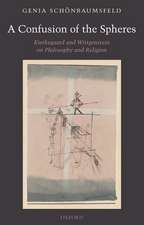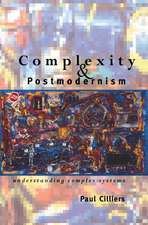Slavoj Žižek and Radical Politics
Autor Sean Homeren Limba Engleză Paperback – 19 mai 2016
In Part II Homer explores Žižek’s radicalism through his critique of Alain Badiou, arguing that Badiou’s "affirmationism" provides a firmer grounding for the renewal of the left than Žižek’s negative gesture analyzed in Part I. What distinguishes Žižek from the majority of the contemporary Left today is his valorization of violence; Homer tackles this issue head-on in relation to political violence in Greece. Finally, Homer defends the utopian impulse on the radical left against its Lacanian critics.
| Toate formatele și edițiile | Preț | Express |
|---|---|---|
| Paperback (1) | 405.49 lei 6-8 săpt. | |
| Taylor & Francis – 19 mai 2016 | 405.49 lei 6-8 săpt. | |
| Hardback (1) | 761.76 lei 6-8 săpt. | |
| Taylor & Francis – 3 iun 2016 | 761.76 lei 6-8 săpt. |
Preț: 405.49 lei
Nou
Puncte Express: 608
Preț estimativ în valută:
77.59€ • 80.05$ • 64.75£
77.59€ • 80.05$ • 64.75£
Carte tipărită la comandă
Livrare economică 27 martie-10 aprilie
Preluare comenzi: 021 569.72.76
Specificații
ISBN-13: 9781138643581
ISBN-10: 1138643580
Pagini: 130
Dimensiuni: 152 x 229 x 11 mm
Greutate: 0.2 kg
Ediția:1
Editura: Taylor & Francis
Colecția Routledge
Locul publicării:Oxford, United Kingdom
ISBN-10: 1138643580
Pagini: 130
Dimensiuni: 152 x 229 x 11 mm
Greutate: 0.2 kg
Ediția:1
Editura: Taylor & Francis
Colecția Routledge
Locul publicării:Oxford, United Kingdom
Public țintă
Postgraduate and UndergraduateCuprins
Part I: Žižek in the Balkans
Introduction: The Case of Kosovo
1. It’s the Political Economy, Stupid! On Žižek’s Marxism.
2. Nationalism, Ideology and Balkan Cinema.
3. To Begin at the Beginning Again: Žižek in the Former Yugoslavia.
Part II: Radicalising Žižek
Introduction: Thinking Through Žižek and Beyond
4. The Politics of Comradeship: Philosophical Construction and Commitment in Alain Badiou and Slavoj Žižek.
5. On "The Critique of Violence" and Revolutionary Suicide.
Conclusion: Resources of Hope: A Critique of Lacanian Anti-Utopianism.
Introduction: The Case of Kosovo
1. It’s the Political Economy, Stupid! On Žižek’s Marxism.
2. Nationalism, Ideology and Balkan Cinema.
3. To Begin at the Beginning Again: Žižek in the Former Yugoslavia.
Part II: Radicalising Žižek
Introduction: Thinking Through Žižek and Beyond
4. The Politics of Comradeship: Philosophical Construction and Commitment in Alain Badiou and Slavoj Žižek.
5. On "The Critique of Violence" and Revolutionary Suicide.
Conclusion: Resources of Hope: A Critique of Lacanian Anti-Utopianism.
Notă biografică
Sean Homer is Professor of Film and Literature at the American University in Bulgaria.
Recenzii
'Critical framing of Žižek’s work in his Balkan and Yugoslav context, as his repressed "maternal space," in order to test overall validity of his so-called radical political praxis is what distinguishes Homer’s book from all other books on Žižek.' - Dušan I. Bjelić author of Normalizing the Balkans. Geopolitics of Psychoanalysis and Psychiatry (2011)
'Sean Homer shows the political value of a strict and profoundly antagonistic reading of Slavoj Žižek’s work, a reading that does not shy from a necessary degree of interpretative violence to open up fissures in a body of work that pretends to be a system. With the context as the Balkans and crucial conceptual leverage provided by Alain Badiou, this radical scholarly book elaborates a distinctive argument in which violence is pitted against violence. Here we have a body of work as symptom laid bare, and through the course of the reading the reader can come to see more clearly how that symptom consists of a series of contradictions, speaks of a problem that it is not yet conscious of. Homer makes this symptom speak.' - Ian Parker, Psychoanalyst, Manchester, Professor of Management, University of Leicester, UK.
'Sean Homer shows the political value of a strict and profoundly antagonistic reading of Slavoj Žižek’s work, a reading that does not shy from a necessary degree of interpretative violence to open up fissures in a body of work that pretends to be a system. With the context as the Balkans and crucial conceptual leverage provided by Alain Badiou, this radical scholarly book elaborates a distinctive argument in which violence is pitted against violence. Here we have a body of work as symptom laid bare, and through the course of the reading the reader can come to see more clearly how that symptom consists of a series of contradictions, speaks of a problem that it is not yet conscious of. Homer makes this symptom speak.' - Ian Parker, Psychoanalyst, Manchester, Professor of Management, University of Leicester, UK.
Descriere
In this book, Sean Homer addresses Slavoj Žižek’s work in a specific political conjuncture, his political interventions in the Balkans.

















